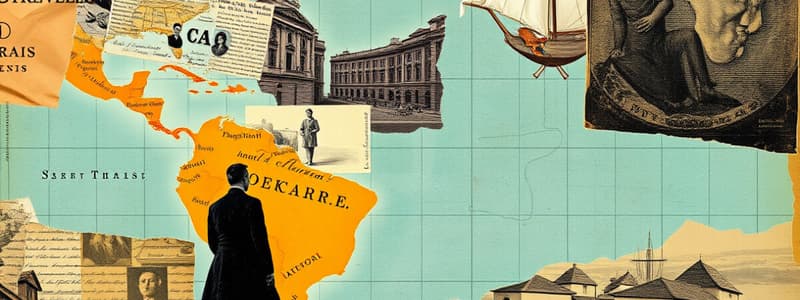Podcast
Questions and Answers
Which motives drove European nations to explore and colonize the New World?
Which motives drove European nations to explore and colonize the New World?
- Culture, trade, and diplomacy
- Wealth, land, and technology
- Power, treaties, and alliances
- God, gold, and glory (correct)
What historical event inspired religious motivations for colonization in the New World?
What historical event inspired religious motivations for colonization in the New World?
- The Renaissance
- The Enlightenment
- The Reformation
- The Crusades (correct)
What was the primary goal of the Reconquista in relation to European motivations?
What was the primary goal of the Reconquista in relation to European motivations?
- To reclaim and convert territory from Muslim rule (correct)
- To expand territory into North America
- To create alliances with Native Americans
- To establish trade routes to Asia
How did the Crusades influence European attitudes toward exploration?
How did the Crusades influence European attitudes toward exploration?
What role did the city of Jerusalem play in the motivations for European conquest?
What role did the city of Jerusalem play in the motivations for European conquest?
Flashcards are hidden until you start studying
Study Notes
Motivations for European Conquest of the New World
- Three primary motives for European exploration: God, gold, and glory.
- Religious motivations linked to the Crusades (11th-15th centuries), aimed at establishing Christian dominance over Jerusalem.
- The Crusades fostered increased religious intolerance and inspired further religious conquests during the Reconquista, the 800-year effort to expel Muslims from the Iberian Peninsula.
- As the Crusades ended, European Christians sought to convert Native Americans, driven by zeal from strongly Catholic nations like Spain and Portugal.
Economic Motivations: The Lure of Gold
- The Crusades established significant maritime trade between Europe and the East, generating demand for luxury goods such as silk and spices.
- The costly and dangerous Silk Road led merchants to seek more efficient maritime trade routes, especially to the Spice Islands (modern-day Indonesia).
- Competitors aimed to eliminate Muslim middlemen and profit from the direct trade of Eastern goods.
Competition and Glory: European Rivalry
- Intense competition between Portugal and Spain spurred rapid colonization efforts.
- Prince Henry the Navigator led Portugal's exploration efforts, focusing on Africa and the Atlantic during the 1400s.
- Portuguese navigators established crucial trading footholds along West Africa, India, Brazil, and Atlantic islands, enhancing maritime control and trade routes.
- Contacts with western Africa introduced the Portuguese to the African slave trade, leading to the establishment of a brutal market for enslaved people to work on sugar plantations.
Impacts of Exploration
- The intermingling of religious zeal and economic ambition drove European nations to explore and colonize the New World.
- European colonization initiated a cycle of conquest, trade, and exploitation with far-reaching consequences for Indigenous populations and global economics.
Studying That Suits You
Use AI to generate personalized quizzes and flashcards to suit your learning preferences.




